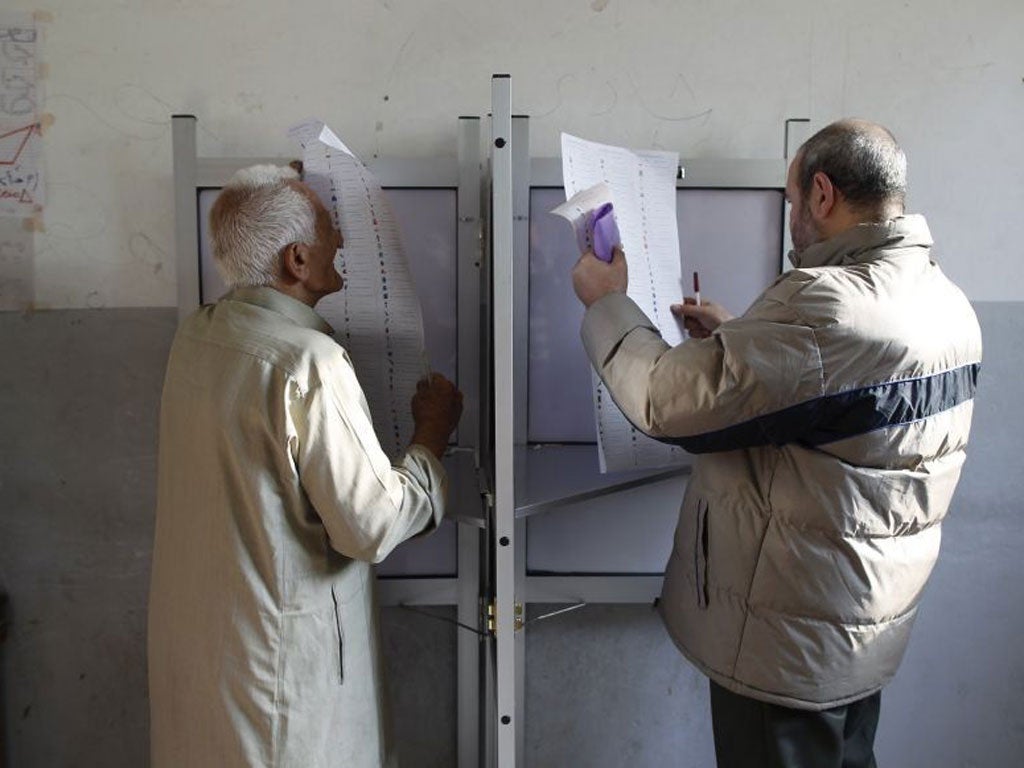Long queues as Egypt holds landmark vote

Shaking off years of political apathy, Egyptians went to voting stations today in the first parliamentary elections since Hosni Mubarak's removal, a giant step toward what they hope will be a democracy.
Some took their children, saying they wanted them to learn how to exercise their rights as they cast ballots in what promises to be the country's fairest and cleanest election.
With fears of violence largely unrealised, the biggest complaint was the hours of standing in long, slow-moving queues.
After the dramatic, 18-day uprising that ended Mubarak's three decades of authoritarian rule, many had looked forward to this day in expectation of a celebration of freedom. But Mubarak's fall on February 11 was followed by nearly 10 months of military rule, divisions and violence and when election day finally arrived, the mood was markedly different. People were eager to at last cast a free vote, but daunted by all the uncertainty over what happens next.
Even as they voted, Egyptians were sharply polarised and confused over the nation's direction.
On one level, the election will be a strong indicator of whether Egypt is heading toward Islamism or secularism. The Muslim Brotherhood, Egypt's largest and best organised group, along with other Islamists are expected to dominate in the vote. Many liberals, leftists, Christians and pious Muslims who oppose mixing religion and politics went expressly to the polls to try to stop them or at least reduce their victory.
The US and its close ally Israel, which has a long-standing peace treaty with Egypt, worry that stronger Brotherhood influence could end Egypt's role as a major moderating influence in Middle East politics.
Also weighing heavily on voters' mind was whether the election can really set Egypt on a path of democracy while it is still under military rule.
Another concern is that the parliament that emerges may have little relevance because the military is sharply limiting its powers, and it may only serve for several months.
The Egyptian election is the fruit of the Arab Spring revolts that have swept the region over the past year, toppling several authoritarian regimes. In Tunisia and Morocco, Islamic parties have come out winners in elections the past month, but if the much larger Egypt does the same, it could have an even greater impact.
Even before voting began at 8am, people stood in lines stretching several hundred yards outside many polling stations in Cairo, suggesting a respectable turnout. Under heavy security from police and soldiers, segregated lines of men and women grew, snaking around blocks and prompting authorities to extend voting by two hours.
Many said they were voting for the first time. For decades, few Egyptians bothered to cast ballots because nearly every election was rigged, whether by bribery, ballot box stuffing or intimidation by police at the polls. Turnout was often in the single digits.
The Brotherhood entered the campaign armed with a powerful network of activists around the country and years of experience in political activity. Even though it was banned under Mubarak's regime, its politicians sat in parliament as independents. Also running is the even more conservative Salafi movement, which advocates a hard-line Saudi Arabian-style interpretation of Islam. While the Brotherhood shows at times a willingness to play politics and compromise in its ideology, many Salafis make no bones about saying democracy must take a back seat to Islamic law.
In contrast, the secular and liberal youth groups that ousted Mubarak failed to capitalise on their astonishing triumph to effectively contest the election. They largely had to create all-new parties from scratch, most of which are not widely known among the public and were plagued by divisions through the past months.
But the Brotherhood faces still opposition. Even some who favour more religion in public life are suspicious of their motives, and the large Christian minority - about 10 % of the population of around 85 million - deeply fear rising Islamism.
The election is a long and unwieldy process. It will be held in stages divided up by provinces. Voting for 498-seat People's Assembly, parliament's lower chamber, will last until January, then elections for the 390-member upper house will drag on until March.
Join our commenting forum
Join thought-provoking conversations, follow other Independent readers and see their replies
Comments
Bookmark popover
Removed from bookmarks